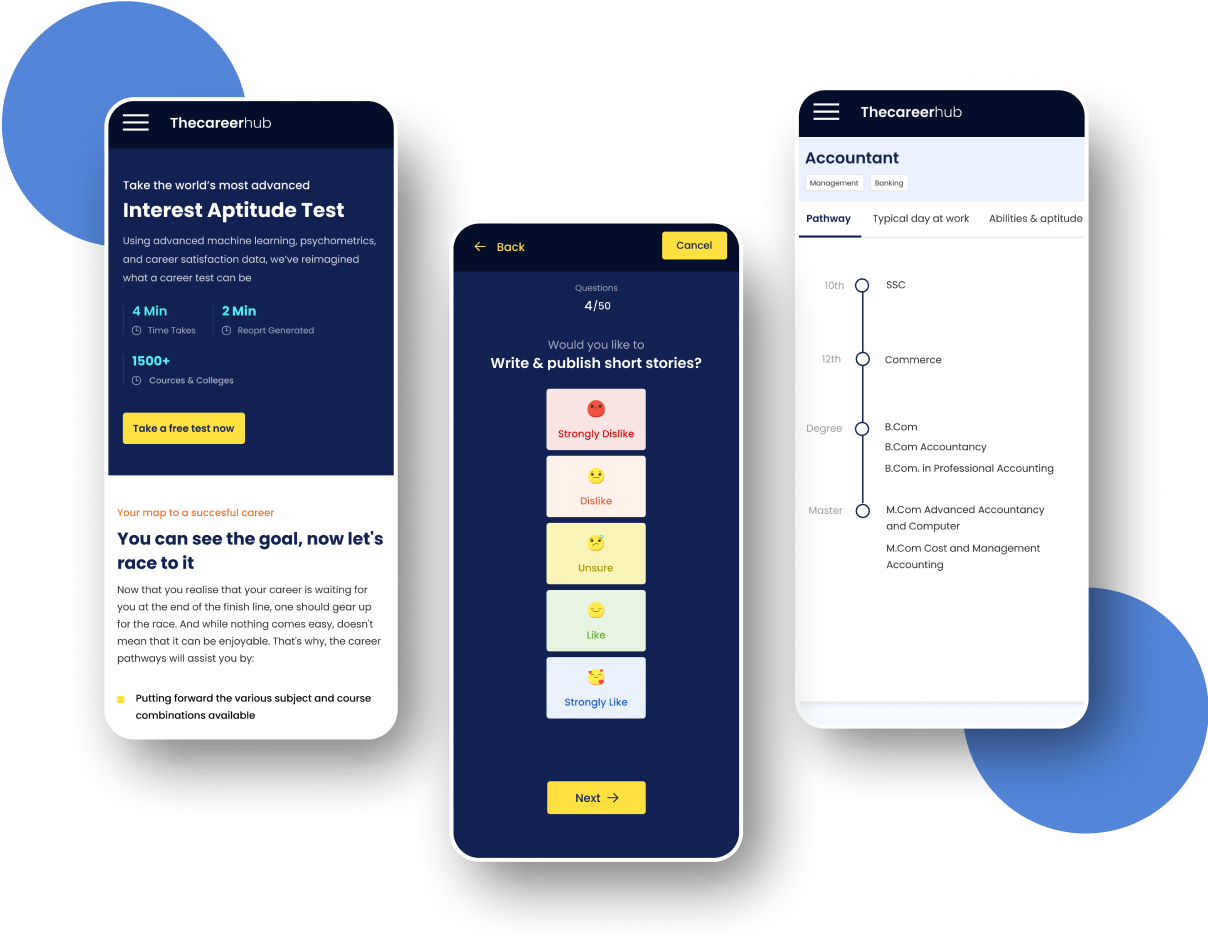What is Aptitude?
Your innate ability to accomplish diverse things is referred to as aptitude. Your intrinsic ability or capacity to learn, as well as your habits and tendencies, are referred to as aptitude. Your aptitudes are the ease with which you can learn natural or learned skills. We're talking about your capacity to learn and execute a skill when we claim you have a high aptitude for talent. A child's future performance may be predicted based on such talents. Aptitude is evidently something that comes naturally or without effort to you. Knowing your abilities is crucial while searching for a new job or contemplating a career change since it will direct you in the right direction. Working in professions that use your skills will be more enjoyable and gratifying.
What is an Aptitude Test in Mumbai?
The Aptitude Test in Mumbai is a tool for determining one's established or emerging talents and interests. Aptitude tests are important in determining the correct career to pursue and in preparing for it. The most common and time-tested assessment done throughout the academic term and for business management is the online aptitude test & psychometric exam.
A career aptitude test may help you comprehend the connection or relationship between your cognitive ability, career sectors, and job performance. The aptitude test will always provide a profile that will reveal one's capabilities as well as areas where more development is necessary.
An aptitude test in Mumbai is a popular way to determine a person's eligibility for a certain job. As a result, aptitude tests are given to people who are on the verge of making a professional decision or who wish to improve their current one. The aptitude test is therefore highly encouraged and desired by everybody, and it acts as a data point for career planning and execution via career counselling.
It is now much easy to get standardised aptitude testing. Kids may take an online aptitude test in Mumbai and will not have to wait long for the results since they will be available in minutes, and they will be devoid of human mistakes and prejudice.
Benefits of Aptitude Test in Mumbai
Aptitude tests are often highly specific and conducted to evaluate candidates for certain courses in college, professional degrees (such as business and law), and recruiting and employment in certain companies. In any case, one can appear for the comprehensive tests at the school level itself in order to track future prospects. Benefits include:
- Prepares you for a career that is right for you
- Performs a SWOT Analysis for You
- Assists Parents, Guardians & Mentors in understanding their child's talents and interests
- Aligns them with their professional interests
- Develops strategies to overcome obstacles along the way
- Tells them about the demands of a particular field
- Providing Educational Grooming
- Offers a variety of careers and their educational requirements
Hence, both students and corporate institutions use the aptitude test for various purposes, such as SWOT analysis, subject selection, career development, and so on. With respect to the person's background and normalized scores, the Aptitude Test evaluates the skills and talents acquired. As well as highlighting career choices on the basis of strengths, the result does not force one to limit themselves to their strengths. It promotes the ability to keep all career options open by focusing on all aspects.
When should you take an aptitude test?
Brainwonders career counselling institutes offer the Aptitude Test in Mumbai.
For advanced mapping, one can pair it with their DMIT Test and IQ Test analysis (report). It is often useful to be all-encompassing and specific when planning one's future career path- and for the same reason, understanding one's strengths, aptitude, interests, and innate qualities is crucial.
What is evaluated by the aptitude test in Mumbai?
The aptitude test assesses the following characteristics, which may be used to guide personal, social, and professional development.
Spatial Visualization
Mental rotation and manipulation of 2D and 3D shapes and objects.
Numerical Understanding
Mathematical proficiency including calculations and mental arithmetic
Creativity
An ability to use an out-of-the-box approach and abstract thinking to contextualize information
Linguistic Ability
Includes evaluating reading comprehension, grammar and spelling skills
Perceptual Speed and Accuracy
Making simple inferences based on the information provided
Mechanical Comprehension
Understanding basic technical concepts and principles
What are the many types of aptitude?
1. Verbal Reasoning:
Verbal reasoning entails assessing a person's comprehension of written content. The verbal reasoning aptitude test assesses a person's ability to comprehend, spell, apply proper syntax, and grasp words.
- The verbal reasoning is often assessed by delivering a paragraph or multiple paragraphs and asking questions about them.
- In the spelling section, the test taker is presented with four or five distinct spellings of the same word or four or five separate terms, and the test taker is asked to identify the one that is properly spelt.
- In the grammar part of the verbal reasoning exam, the test taker will be presented with many statements and asked to choose the most grammatically accurate sentence.
- Understanding words and their meanings are covered in another section. You may be asked to identify a term's definition or to select a word that is the polar opposite of the highlighted or bolded word.
Because most jobs need you to either comprehend and make judgments based on verbal or written information, or to communicate this sort of knowledge to others, these questions occur in most general aptitude tests.
2. Numerical Analysis:
Numerical Reasoning is a sort of aptitude that involves an individual's statistical abilities. Aptitude tests are used to determine a person's competence level based on their knowledge of numbers, number sequences, graphs, tables, and computations, such as mathematical equations, which provide a clear picture of Numerical Reasoning.
In other words, fundamental numeracy is part of this sort of aptitude.
Aptitude tests are immediately relevant to a wide range of administrative and clerical positions, but they may also be found as part of graduate and management exams.
Blocks of information are supplied in more complicated data interpretation and numerical critical thinking challenges that must be manipulated and interpreted.
Employers normally want some indication of your ability to utilise numbers, even if it is not a key component of the work, therefore these questions occur in most general aptitude tests.
3. Abstract Reasoning: Assess your ability to think abstractly about angles and forms. The capacity to detect the underlying logic of a pattern and subsequently decide the solution is measured by abstract reasoning and diagrammatic reasoning exams.
The capacity to think abstractly is thought to be the strongest measure of fluid intelligence and your ability to pick up new information fast.
These aptitude tests are very useful when hiring individuals for technical occupations that need them to deal with abstract ideas or concepts. They may also be used to assess abstract thinking skills.
However, since they are the greatest assessment of your overall intellectual capacity, you will almost always encounter some questions of this kind in whatever examinations you are given.
4. Mechanical Inference:
The capacity to recall shapes and items in the correct sequence is part of mechanical reasoning. The next portions of the examination are specifically intended to measure your understanding of physical and mechanical concepts, such as pulleys, levers, and rudimentary electrical circuits.
Answering these questions does not need specialised knowledge; simply a basic comprehension of the concepts is necessary.
Mechanical reasoning problems are utilised in a variety of vocations, including the military (Armed Services Vocational Aptitude Battery), police forces, fire departments, and numerous craft, technical, and engineering occupations.
5. Spatial Reasoning:
Your capacity to handle forms in two dimensions or envision three-dimensional items as two-dimensional images is measured by spatial ability.
In manufacturing, technical, and design industries that involve plans and drawings, such as engineering, architecture, surveying, and design, spatial competence is necessary.
It's also significant in several fields of study where the capacity to see interactions between three-dimensional components is required.
Visual assembly and disassembly of rotated or flipped items are common visual assembly and disassembly questions used to assess spatial skills.
6. Clerical Reasoning:
Clerical Reasoning measures a person's degree of focus and accuracy.
In most cases, these exams are graded on both speed and accuracy.
They're most often utilised when interviewing applicants for administrative and clerical occupations where errors may be costly or fatal.
Financial services, legal services, and healthcare are examples of this.
What is the most effective method of preparing for an aptitude test?
Giving a test may be stressful, which might have an impact on the results. Individuals taking an aptitude test should have a good night's sleep to help them relax and answer the questions correctly, as well as read the guidelines on the test paper attentively.
Individuals should practise a few exams ahead of time to acquire a feel for the kind of questions that may be asked. Because aptitude tests are timed, candidates may practise the test to increase their speed.
Taking the test ahead of time may assist them in learning about the questions that they will be unable to answer.
How do you take an aptitude test?
Register and take the test
Brainwonders aptitude test is timed and has a multiple-choice structure. (Either online or offline)
Evaluation
The inputs of the customers are rated using a standardised key as an objective test.
Interpretation & Report
A thorough report and aptitude profile are prepared and assembled.
Certification and guidance
The counsellor individually explains the findings, taking into account the client's subjective requirements, and adds some developmental ideas.
Career Aptitude Test for Everyone
Aptitude Test for Junior Primary (7-8 years)
Parents, teachers, and other mentors may utilise the analysis to establish particular goals and pick instructional approaches as the kid begins to explore the world of formal education.
Aptitude Test for Senior Primary (9-10 years)
This is the ideal age to learn how a kid acquires and grasps specific ideas and abilities, and the findings may be utilised to mould the child in ways other than academics.
Aptitude Test for Middle School (11-12 years)
At this point, school courses continue to diversify into various areas focusing on particular topics and themes, each with its own set of requirements, while students must also pursue extracurricular interests.
Aptitude Test for Lower Secondary (13-14 years)
The test profile would be able to give a SWOT analysis of the child's journey so far, which the child and applicable advisers may use to investigate other career alternatives and overcome any personal barriers to their professional aspirations.
Aptitude Test for Higher Secondary (15 years+)
By this time, one is able to understand that one cannot make a career decision only on the basis of interests and current strengths. Future-oriented elements such as job happiness, opportunities, and work-life balance should become obvious, and then a particular professional route may be pursued.
Aptitude Test for Adults and Corporates (18 years+)
Many companies utilise aptitude tests not just during the recruiting process, but also on a regular basis to assess their workers' progress. Adults and working professionals, meanwhile, profit from utilising it to raise their own profile.
Aptitude versus IQ assessment
It's common to mistake aptitude tests with IQ testing, but they're two quite different sorts of assessments with very different results. In other words, an IQ (Intellect Quotient) test indicates a person's statistical intelligence, and an aptitude (General Intellect) test evaluates how well that person can apply that intelligence to diverse circumstances.
Both aptitude and IQ tests are used in career counselling and picking a great vocation for oneself since one offers information on inherent cognitive capabilities while the other provides information on how effectively one will be able to utilise these abilities in everyday life. These examinations are supplemented by other assessments such as personality tests and interest tests. All of these tests together give a thorough picture of the test taker's employment possibilities.
Features of Brainwonders Online Aptitude Test:
Online: The Brainwonders Aptitude test is accessible online, so you may take it from anywhere in the globe. All that is required is the company's issued login and password.
Dependable: A dependable measure is one that properly measures a notion throughout time, across people, and in different circumstances. As a consequence, an aptitude test is designed in such a manner that its outcomes may be relied upon. This means that, although a person's evaluations may vary somewhat with age and situation, they are generally consistent and accord throughout time.
Valid: A measure that correctly measures what it promises to measure is said to be valid. This means that the test will eventually evaluate diverse aptitudes, regardless of whether it is used for educational, therapeutic, or diagnostic purposes. Validity refers to whether the test questions are accurate enough to evaluate that specific feature.
Standardised: A test is administered and graded in a predictable, or "standard" way. Every time a standardised test is administered, the same questions, administration conditions, scoring methodologies, and interpretations are used. When a test is standardised, it follows a set of procedures, which reduces the risk of scoring and administration errors. As a result, a talented youngster will excel on two independent aptitude tests, which are both standardised and so dependable and legitimate. The Brainwonders test is an online, timed test with a set process for administration.
Norms: Norms describe the score distribution of a test in a representative sample, providing us with a standard frame to evaluate individual findings. Norms help test takers interpret test findings. By changing raw results in a usable way, test users may utilise derived scores to compare, explain, and make the right judgements. The results of the test are then used to evaluate an individual's performance. Aptitude scores, for example, are calculated using norms based on the results of previous test-takers.
Quick and efficient: The Aptitude test is accessible online at Brainwonders. The online aptitude tests are simple to use and deliver immediate results.
Aptitude tests may help you advance your career in the following ways:
Knowledge of Potentials: Aptitude exams are used to determine a person's potential in a variety of disciplines. The test findings help the career coach evaluate and offer acceptable career options for the students based on their skill sets. Furthermore, the result provides them with greater faith in their capacity to work hard in order to achieve their professional goals.
Unbiasedness of testing: Artificial Intelligence currently drives aptitude tests that are completely unaffected by external factors. The raw intelligence and competence of pupils are the key driving indicators of the aptitude exam.
Recognizing your abilities: Identifying and mapping one's capabilities to professional goals is the first step toward success.
Determine your personality type: An aptitude test not only assists in the selection of the suitable professional route, but it also helps in the understanding of the test taker's personality. Students who are aware of their personalities, employment options, and talents may make informed decisions. Students may receive the right education or skills based on the results of the aptitude test, which will help them succeed in their employment.
Not conclusive: One of the most essential qualities of an aptitude test is that it is inconclusive. Students may assess their abilities by completing multiple-choice tests. The results may be used as a baseline for comparing a person's IQ values throughout time.
Mumbai is a major educational and learning hub. Educational institutions are regarded for providing students with a well-rounded education. Brainwonders Mumbai career counsellors have a wealth of experience, education, and information. We don't just provide career recommendations; we build a personalised action plan for each applicant to help them thrive in their chosen sector. At Brainwonders employment career counselling centre, students may take a recognised Aptitude test, Interest test, Personality test, and DMIT test. These tests may be used by professional counsellors to assess a student's innate qualities, abilities, and potential, providing them with an advantage in determining which career route is best for them.












